| dc.description.abstract | Background Globally, gestational diabetes mellitus complicates 1 in 6 pregnancies and increases future risk of type 2 diabetes and cardiovascular disease in the affected women. There is a lack of consensus on the optimal follow-up of these women. eHealth is emerging as a health care tool, but its practical utility and advantages over standard care in the follow-up after pregnancy complications remains to be determined. Our aim was to systematically review
the existing literature on cardiovascular follow-up after gestational diabetes, the utility of eHealth technology for this purpose, and to identify research gaps.
Methods WeperformedasystematicscopingreviewfollowingapublishedprotocolandtheJoannaBriggsmethodol- ogy for studies up until May 2022. Four databases were searched: Ovid MEDLINE, Embase, Maternity and Infant Care,
and Cochrane Database of Systematic Reviews. Primary research articles and systematic reviews were included in the final analyses. Two reviewers independently screened abstracts and performed full text assessment. Data was extracted using
a data charting form. In all stages of the process, if consensus was not reached, a third reviewer was consulted. The findings from the data charting process provided the basis for summarizing the findings from the included studies.
Results The search of the databases generated 2772 hits. After removing duplicates and manually adding a total of 19 studies, reviews, and guidelines, a total of 2769 titles and abstracts were screened, and 97 papers underwent full-text review. In the final analyses, 15 articles and 12 systematic reviews were included, whereas guidelines are presented as supplementary material.
No studies were identified that examined follow-up regarding long-term overall cardiovascular risk after gestational diabetes. Various lifestyle interventions were tested for individual cardiovascular risk factors, with diverging effects. eHealth technologies were found acceptable by participants but had no consistent, statistically significant effect on relevant health outcomes.
Conclusions This scoping review of the existing literature revealed neither an established systematic cardiovascular follow-up strategy for women after gestational diabetes nor evidence that eHealth technologies are superior to con- ventional follow-up. Further research into the utility of eHealth in cardiovascular follow-up after complicated pregnan- cies should include longer-term follow-up and core cardiovascular outcomes. | en_US |

